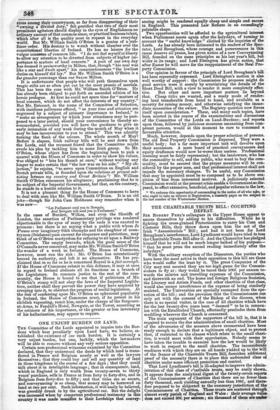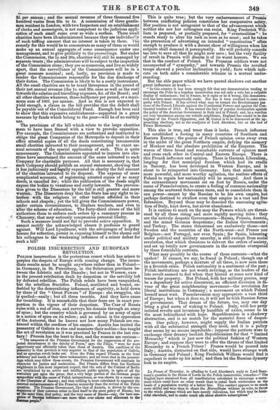THE CHARITABLE TRUSTS BILL: COURTING DEFEAT.
San ROBERT PEEL'S colleagues in the Upper House appear to amuse themselves by adding to his difficulties. While he is fighting the cross-grained Protectionists to carry his Corn and Customs Bills, they throw down upon him the net of the Irish " Assassination " Bill ; and had it not been for Lord Brougham's interference, Lord Lyndhurst would have tried to toss the Charitable Trusts Bill after it. And the Chancellor has pledged himself that he will not be much longer balked of his purpose- " that he must press the second reading immediately after the holydays." With the solitary exception of the Dissenters, the parties who have been the most active in their opposition to this bill are those who would suffer the least by it. The great Companies of the City may rest assured they are too high game for the Commis- sioners to fly at : they would be taxed their 100/. per annum to- wards the salaries and travelling expenses of the Commission, and therewith an end. The home and foreign Religious Societies, the Literary and Artists Funds, and other charities of that class, would also escape interference at the expense of being similarly mulcted. The Universities are specially exempted from the ope- ration of the bill ; and the provision that the Commissioners can only act with the consent of the Bishop of the diocese, when there is no special visiter, in the case of all charities which have for the last twenty-five years been " deemed " to be in connex- ion with the Established Church, effectually precludes them from meddling wherever the Church is concerned. The main argument of the supporters of the bill is, that it is required to secure the due administration of small charities. Most of the adversaries of the measure above enumerated have been ready enough to declare that a legitimate object, and to protest that, if restricted to the clauses which relate to the small chari- ties, it would meet with their approbation. Nobody seems to have taken the trouble to examine how the law would be likely to work in respect to the small charities. The inconsiderate readiness with which they are on all hands yielded up to the will of the framer of the Charitable Trusts Bill, furnishes additional proof of the necessity there is to place this unfriended class of charities under some efficient protection and control. That Lord Lyndhurst's bill is ill-adapted to improve the admin- istration of this class of charitable trusts, may be easily shown. It appears from the analytical digest of the twenty-seven reports of the Commissioners of Charities that there are no fewer than forty thousand, each yielding annually less than 100/., and there- fore proposed to be subjected to the summary jurisdiction of the Commissioners of Charities, Them trusts are scattered through almost every parish of 'England and Wales : their average value does not exceed 801. per annum; six thousand of them are under I. per annum ; andy the annual revenue of three thousand five hundred varies from 20s. to Is. A commission of three gentle- men resident in London, with two Inspectors and an establishment of clerks and messengers, is not competent to the judicious appli- cation of such small sums over so wide a surface. These small charities have been ill-administered because they are individually of such trifling amount that no interest is taken in them. The remedy for this would be to concentrate so many of them as would make up an annual aggregate of some consequence under one management, and to give publicity to the proceedings. But under the Commission, the Is. and 20s. charities will still be managed by separate trusts ; the administrators will be subject to the inspection of the Commission alone; they are so numerous, and live so widely apart, that the surveillance of the Commissioners will be in a great measure nominal ; and, lastly, no provision is made to render the Commissioners responsible for the due discharge of their duties. The Commission is likely to be a costly instrument. All the small charities are to be taxed threepence in the pound of their net annual revenue (the is. and 20s. ones as well as the rest) towards the salaries and travelling expenses, &c. of the Board; and all other charities whatever, three-halfpence per pound, or a maxi- mum sum of 100/. per annum. And as this is not expected to yield enough, a clause in the bill provides that the deficit shall be payable out of the Consolidated Fund. Enough has been said to show that this expensive establishment—supported in a great measure by funds which belong to the poor—will be of no earthly use.
The provisions of the bill which relate to the large charities seem to have been framed with a view to provoke opposition. For example, the Commissioners are authorized and instructed to oblige the great Companies of the Metropolis to deposit in their office attested copies of all the deeds constituting innumerable small charities intrusted to their management, and to exact an- nual accounts of the special application of each. This is quite unnecessary. The Commissioners appointed to inquire into cha- rities have ascertained the amount of the sums intrusted to each Company for charitable purposes. All that is necessary is, that each Company should publish an annual statement, showing that it has judiciously, and legally expended in charity the full amount of the charities intrusted to its disposal. The expense of more complicated accounts, of registering attested copies of so many deeds, is uncalled for ; while the publication of the deeds might expose the bodies to vexatious and costly lawsuits. The provoca- tion given to the Dissenters by the bill is still greater and more wanton. The Dissenters deny that the State has any right to in- terfere with the religious or other tuition afforded in their schools and chapels ; yet the bill gives the Commissioners power, under certain circumstances, to displace teachers, and even tO alter the scheme of education. The forty-third clause of the bill authorizes them to enforce such orders by a summary process in Chancery, that may seriously, compromise personal liberty.
Such a measure could not fail to provoke active opposition. It cannot rectify the acknowledged abuses it professes to guard against. Will Lord Lyndhurst, with the advantages of holyday leisure for reflection, persist in exposing himself to the shame and his colleagues to the weakening influence of a minor defeat for such a bill?



























 Previous page
Previous page